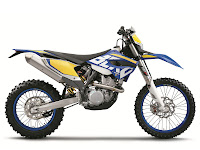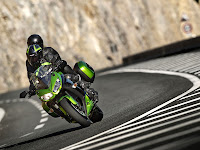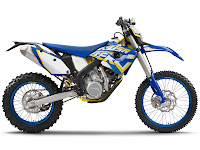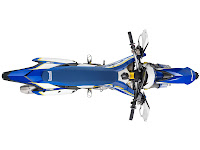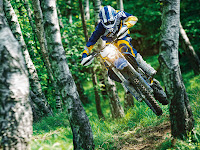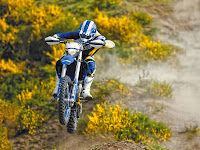2012 Kawasaki Ninja 1000
Specifications
US MSRP Price: $11,199.00 USD
• Engine Four-stroke, liquid-cooled, DOHC, four valves per cylinder, inline-four
• Displacement 1,043cc
• Bore x Stroke 77.0 x 56.0 mm
• Compression Ratio 11.8:1
• Fuel System DFI® with four 38mm Keihin throttle bodies, oval sub-throttles
• Ignition TCBI with digital advance
• Transmission Six-speed
• Final Drive X-ring Chain
• Rake/Trail 24.5 deg / 4.0 in.
• Front Tire Size 120/70 ZR17
• Rear Tire Size 190/55 ZR17
• Wheelbase 56.9 in.
•
Front Suspension / wheel travel 41 mm inverted cartridge fork with
stepless compression and rebound damping, adjustable spring preload /
4.7 in.
• Rear Suspension / wheel travel Horizontal monoshock with stepless rebound damping, adjustable spring preload / 5.4 in.
• Front Brakes Dual 300mm petal-type rotors with radial-mount four-piston calipers
• Rear Brakes Single 250mm petal-type rotor with single-piston caliper
• Fuel Capacity 5.0 gal.
• Seat Height 32.3 in.
• Curb Weight 502.7 lbs.
• Overall length 82.9 in.
• Overall width 31.1 in.
• Overall height 48.4 in.
• Color Choices Metallic Spark Black / Metallic Flat Micron Gray, Candy Lime Green / Ebony
Warranty 12 Months
Good Times™ Protection Plan 12, 24, 36, 48 months
2012 Kawasaki Ninja 1000 Review
The
Ninja is blessed with rideability – an incredible blend of ability on
the street and extreme ease of operation. The source of all this
two-wheeled goodness is Kawasaki’s own – and now legendary – Z1000 super
standard, the engine and chassis platform upon which the Ninja 1000 is
based. The Z1000 has earned some of motorcycling’s highest accolades,
including the prestigious Motorcycle of the Year "MOTY" award from
Motorcyclist magazine and a slot in Cycle World’s Ten Best collection as
the "Best Standard" for 2010 and 2011. With guts like that, it’s easy
to see where the big Ninja’s impressive chops come from.

With
the Z1000’s impressive engine and chassis package as a starting point,
Kawasaki engineers added beautifully swooping bodywork and a handful of
brilliant features
(including optional ABS this year), all of which combine to make the
2012 Ninja 1000 an amazingly capable all-around sporting machine.
Power
comes by way of a highly advanced inline-four – a 1,043cc, DOHC,
liquid-cooled, 16-valve engine featuring a long-stroke design for
instantaneous power, a smooth-shifting six-speed gearbox with ideal
ratios, and no-fuss electronic fuel injection for absolutely seamless
throttle response – warm or cold. There’s plenty of power, too – way
over 100 rear wheel horses.
But this engine’s magic is more about
flexible and easy-to-use oomph than simply peak horsepower numbers.
This dead-reliable inline-four produces the sort of power that launches
you out of corners and away from stops in a way that’ll keep you
entertained – and your riding buddies impressed – for years to come. At
seemingly every rpm level, the Ninja 1000 engine produces smooth,
instant-on thrust many hardcore sportbikes simply can’t match.
Kawasaki’s
perfectly calibrated electronic fuel injection helps make this so. The
four 38mm Keihin downdraft throttle bodies inject a perfect mix of
fuel and air into each combustion chamber with help from an advanced
ECU, oval sub-throttles and a cool air intake system that routes fresh
air to the airbox via ducts at the front of the bike. A balance shaft
driven off the crankshaft keeps the solidly mounted engine operating
smoothly, while a beautifully styled 4-into-2-into-2 catalyzer-equipped
exhaust system offers a pleasing growl without being overly loud. It’s
a perfect engine for a road-going sportbike – smooth, powerful,
flexible and blessed with the legendary reliability Kawasakis are known
for.
Like the superb-handling Z1000, the Ninja 1000 features
an advanced aluminum frame similar in design to the Ninja ZX™-10R’s.
The lightweight assembly curves over the engine, cradling it from above
and bolting solidly to it in three places, with a rubber-backed fourth
mount provided for added vibration isolation and torsional rigidity.
This design allowed engineers to keep the bike’s waist narrow for
superb rider interface and maximum comfort and control. The main frame
and swingarm pivot pieces are cast as a single unit, with welds
eliminated wherever possible for seamless aesthetics.
The
wheels, brakes and suspension bits that allow the Ninja to move so
gracefully and swiftly are truly state-of-the-art. Suspension is handled
by a fully adjustable 41mm inverted fork up front and a preload- and
rebound-adjustable single-shock system in back, the ideal scenario for
dialing in the perfect settings for your weight and riding style. The
single-shock system features
a damper mounted nearly horizontally above the swingarm for optimal
mass centralization and heat resistance. The gas/oil shock offers
superb wheel control whether you’re hammering along some deserted
backroad or bopping along a pothole-infested city street. On the Ninja
1000, you’ll always know what’s happening at the contact patches.
Stopping
power is provided by race-spec brakes – 300mm petal-type rotors up
front squeezed by ultra-rigid radially mounted calipers fed hydraulic
pressure by an equally race-spec radial pump master cylinder. In back
is another tech-savvy disc. Braking power and feel at both ends is
amazing, giving rookies, pros and everyone in between a feeling of
supreme confidence. And new for 2012, the Ninja 1000 is available with
confidence-inspiring optional anti-lock brake system (ABS).
The
wheels working with those brakes – lightweight six-spoke
supersport-style units – are also the latest in lightweight production
technology. They not only reduce unsprung weight, which allows the
suspension to function optimally, but carry the latest in radial tire
technology. The result is superb grip, precise handling and reasonably
long tread life.
But easily the most stunning aspect of the Ninja
1000 is its sleek, wraparound bodywork. Designed with an eye on
Kawasaki’s race-ready ZX-6R and ZX-10R, the Ninja offers a thoroughly
radical look, but one that’s unique and memorable. Despite the edgy,
rakish look, the bodywork carves a surprisingly large hole in the
atmosphere, giving riders a quiet cocoon in which to work. A manually
adjustable, 3-position windscreen helps, allowing riders to pick just
the right setting for their height and riding style. Faired-in front
turn signals, a ZX-6R-spec front fender, a stylish tail-section and a
full-featured instrument panel right off the Ninja ZX-6R (with custom
graphics, of course) complete the look.
And despite its radical
look, the Ninja 1000 offers surprisingly comfortable ergonomics. The
handlebars are mounted higher than on a true supersport machine, the
pegs a touch lower, all of which makes the Ninja 1000 a capable
short-haul tourer, and certainly a sportbike you can spend the day
aboard without undue strain. To sweeten the day- or weekend-trekking
deal even more, Kawasaki offers a line of optional touring-oriented
accessories, including hard-case saddlebags and top trunk, heated grips
and more.
It’s rare to find such all-around functionality in a
sporting motorcycle today. But the 2012 Ninja 1000 is a different beast
– one with wide-ranging talent in sport, sport-touring and commuting
roles. As Motorcyclist magazine wrote recently: “In the real world we
ride through every day, it doesn’t get much better than the Ninja
1000.”
2012 Kawasaki Ninja 1000 Features and Benefits
Key Features
• 1,043cc inline-four with DFI® offers prodigious torque for effortless passing and backroads entertainment
• Lightweight aluminum frame is narrow and tuned to transmit optimal feedback to the rider
• Fully adjustable inverted fork has settings designed for sporty performance and ride quality
• Design of horizontal back-link rear suspension contributes to mass centralization
• Radial-mounted front brake calipers combine with the radial-pump front brake master cylinder to offer superb control and feel
• Sleek, supersport styling gives the Ninja® 1000 a distinctive look
• Relaxed, upright riding position contributes to all-day comfort
• Larger fuel capacity offers substantial range
• Windscreen is adjustable to three positions, allowing for optimum wind and weather protection
DOHC, 16-valve, 1,043cc Engine
• Liquid-cooled inline-four offers true open-class power from idle to redline
• Easily accessible torque offers instant thrust for maximum rider satisfaction
• Bore and stroke dimensions of 77.0 x 56.0mm offer an ideal balance of peak power and low
• and mid-range flexibility
•
38mm Keihin throttle bodies cram the air/fuel mixture directly into
combustion chambers via downdraft intakes for maximum power
• Oval
sub-throttles help keep the engine slim, and a slim midsection allows
an ideal bike/rider interface for maximum comfort and control
•
Engine’s rev limiter comes into play “softly,” providing usable overrev
character because power doesn’t drop off suddenly at high rpm
• The engine’s relatively low crankshaft position allows a moderately long stroke without adding engine height
•
A secondary engine balancer, driven off a gear on the sixth web of the
crankshaft, eliminates excess vibration and contributes to rider
comfort
Cool Air System
• Intake system routes cool air to the airbox via ducts in the fairing, minimizing performance loss due to heated intake air
• Duct positioning – close to the rider – allows the intake howl to be heard and enjoyed
• Airbox resonator reduces noise at low rpm and enhances intake sound at higher revs
Exhaust System
• The exhaust system features a 4-into-2-pre-chamber-into-2 layout. Silencer end caps maintain the quad-style image
• Main and pre-catalyzers ensure cleaner emissions
•
Thanks to the under-engine pre-chamber, silencer volume is reduced,
and silencer weight is low. Exhaust system offers excellent mass
centralization and contributes to a low center of gravity
Slim-type Fuel Pump
• Slim-type fuel pump features an integral fuel gauge
• Fuel tank design and slim-type fuel pump minimizes dead volume inside the tank; fuel capacity is 5.0 gallons
Bodywork
•
Supersport-style full-fairing bodywork gives the Ninja 1000 a
distinctive, head-turning look, and also offers plenty of wind and
weather protection for short-tour ability
• The fairing’s slat-style leading edges direct wind around the bike, allowing the fairing to be narrower at the middle
• The fairing flares at the rear, keeping hot engine air off the rider’s legs
•
Front turn signals are integrated into the fairing and are attached to
the inside of the fairing with rubber mounts that minimize damage if
the bike falls over
• ZX-6R-spec front fender contributes to excellent aerodynamics and racy looks
• Slim and compact tail cowl moves mass physically and visually toward the front of the bike
• LED taillight features red bulbs and a red transparent lens
• Slim rear fender gives the bike a light-looking rear end
• Windscreen is manually adjustable for optimum wind/weather protection
•
Windscreen has three available positions spanning approximately 20
degrees and ranging from sporty to maximum wind protection. Adjustment
can be done by hand (no tools required) by depressing the release button
below the instrument panel. Windscreen adjustment should always be
done with the bike stopped
Aluminum Backbone Frame
•
Aluminum backbone frame is similar in concept to the Ninja ZX-10R’s,
and helps make the bike narrow and easy to grip with the knees for
maximum rider comfort and feedback
• The frame is lightweight and highly rigid, and uses the engine as a stressed member for solid handling and optimum stability
• Frame elements are tuned to transmit optimal engine feedback to the rider
•
The frame’s five-piece construction consists of steering stem, left
and right main frames, and two cross pieces. The two main frame
components have open C-shaped cross sections
• Welds were eliminated
wherever possible for simplicity and appearance; the frame beams and
swingarm brackets are single die-cast pieces
• The new frame uses four engine mounts, three of which are rigid, one of which (the upper rear crankcase mount) is rubber
• Rear subframe is a three-piece aluminum die-casting assembly that’s light, strong and optimizes mass centralization
•
The sub-frame is an example of form and function combined, negating
the need for side covers and allowing underseat narrowness for a shorter
reach to the ground
Horizontal Back-Link Rear Suspension
•
All-new rear suspension design positions the shock unit and linkage
above the swingarm where it’s less exposed to exhaust heat and
contributes to mass centralization
• Visible from the outside, the horizontal monoshock contributes to the Ninja 1000’s ultra-sporty appearance
•
Linkage characteristics are the same as those of a standard Uni-Trak®
system: Wheel movement versus shock stroke is the same ratio
• The shock features stepless rebound damping and spring preload adjustability for a custom-tuned ride
Fully Adjustable 41mm Fork
•
The Ninja 1000’s inverted fork is adjustable for compression damping,
rebound damping and spring preload – and is protected from harm by a
cool-looking shroud
• Settings are designed for both sporty performance and ride quality
Rider Interface
•
Separate, raised handlebars contribute to the sporty, comfortable
riding position; bar stays are mounted to the fork tube tops, which
extend above the top clamp
• A thick urethane seat provides a high level of rider and passenger comfort
• Tapered-type grips, like those used on supersport models, offer a more direct feel
• Ninja ZX-10R-style footpegs with knurled surfaces offer secure grip, direct feel and control, and no-nonsense looks
• The passenger footpeg brackets incorporate convenient luggage hooks
Instrumentation
• Sporty instrument panel features
a large analog tachometer and multi-function LCD screen. It’s a design
based on the ZX-6R’s unit, but which features original graphics and
coloring
• Functions include speedometer, tachometer, fuel gauge, odometer, clock, dual trip meters and warning lamps
• Hazard switch located on left bar pod
Brakes
• 300mm front petal-type brake discs are gripped by opposed four-piston radial-mount calipers. (Caliper piston size is 4x30mm)
• A radial-pump front brake master cylinder contributes to the superb control and feel offered by these high-end calipers
•
The rear brake is a single-piston, pin-slide caliper gripping a 250mm
petal-type disc. The caliper is mounted below the swingarm, and located
by a torque rod
Large-volume Fuel Tank
• Five-gallon (19L) fuel tank offers substantial range
• Steel construction facilitates use of magnetic tank bag
• Tank shape (flared edges and a trim shape at the back) allows riders to easily grip tank with their knees


